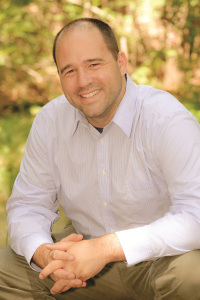David Hartness's Blog
February 16, 2016
Funny Conversation
So I was sitting on the couch with my son today, and he said something kind of funny, yet very insightful. This won’t be a long post, but I wanted to share it with everyone, because it made me think.
Son: Dad, why do we call everyone that isn’t white, people of color.
Me: I don’t know, why do you ask.
Son: shouldn’t it be the opposite.
(I thought for a second before I responded) Me: I don’t know, why do you say that.
Son: When you press on my skin, it doesn’t change color, but when I press on your skin it changes color.
Can’t really argue with logic.
A little something to think about. I thought it was very funny and at the same time he was trying to process race and why we have classifications of color. I guess ultimately, maybe we should just call people, people, and not classify them by the color of skin, but more by ‘the content of their character,’ as Martin Luther King so elegantly stated.


February 13, 2016
Treating Education Like a Corporation
 I have written about this stuff in the past, but I want to expand more on what it is like to manage the education sector more like a corporation. In the corporate world, you pay your employees for the skills and expertise that they bring to the table. If you were a marketing expert, you would demand a salary lucrative towards these skills. You have a bachelor’s degree in the field, and therefore, you would probably have a going rate of $50,000 per year, depending on where you lived. As you gain more experience, your salary and level of responsibility would increase.
I have written about this stuff in the past, but I want to expand more on what it is like to manage the education sector more like a corporation. In the corporate world, you pay your employees for the skills and expertise that they bring to the table. If you were a marketing expert, you would demand a salary lucrative towards these skills. You have a bachelor’s degree in the field, and therefore, you would probably have a going rate of $50,000 per year, depending on where you lived. As you gain more experience, your salary and level of responsibility would increase.
As a teacher, with a bachelor’s degree, you’re going rate would be around $35,000, again, depending on where you live. My mom was a teacher for 20 years and by the time she retired, she was making $50,000 annually. Could you imagine a marketing expert retiring at $50,000 per year? To become a marketing expert, you would need four years of school, the same as a teacher.
Now the first line of defense is, ‘you get into teaching for the love, not the money.’ That is true, but I would argue that you should get into your line of work for the love, not the money. If you market products, sell products, teach, or are a program manager, you should do it because you love it.
On average, teachers spend three years in the profession and then leave. That means we are having less and less experienced teachers in the classroom, and more teachers leaving for better pay and less stress.
In the corporate world, you hire people for a particular job. If they are an analyst, they crunch numbers all day and analyze results. You rarely see a business analyst jump over and start marketing products. As a teacher, you are responsible for teaching students, yet that is not all that you do. When I was a teacher, I taught for 6 hours a day. Also, I ran basketball practice, marketed production for the school, analyzed data, wrote curriculum, developed literacy, English, and other programs. As a teacher, I held these jobs: Program Manager, Data Analyst, Marketer, Administrator, Counselor, trainer, and, of course, the job, I was hired to do, Teach.
Why do teachers get burned out and leave for more lucrative opportunities? They simply understand that they can’t do it all, yet they are expected to do it for little pay.
I want you to imagine a school that hired a data coordinator that takes test scores and analyzes them with national and statewide scores. Someone that takes students raw scores and identifies weaknesses and strengths. The individual, or team, then lays out a 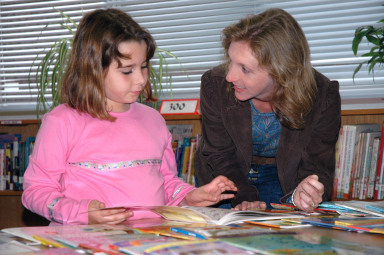 plan for the teachers so that they can change their instruction. What if a school hired program coordinators, to monitor and set up educational field trips, design literacy programs, and math programs, then the teachers, teach these programs. What if schools hired more reading and math specialists to work one on one with weaker students in those subjects. Most schools have a reading specialist, but more than likely these specialists are also classroom teachers. The point is this. A corporation hires experienced experts for a particular job. Teachers are not experts in analyzing data, and in fact, most teachers try to run away from it (except the math teacher’s). So if they aren’t experts at it, they probably aren’t doing an excellent job.
plan for the teachers so that they can change their instruction. What if a school hired program coordinators, to monitor and set up educational field trips, design literacy programs, and math programs, then the teachers, teach these programs. What if schools hired more reading and math specialists to work one on one with weaker students in those subjects. Most schools have a reading specialist, but more than likely these specialists are also classroom teachers. The point is this. A corporation hires experienced experts for a particular job. Teachers are not experts in analyzing data, and in fact, most teachers try to run away from it (except the math teacher’s). So if they aren’t experts at it, they probably aren’t doing an excellent job.
If schools ran more like a corporation, you would have less teacher’s leaving, educators would be paid for the job that they do, and schools would hire more industry experts, and therefore, students would get a better education because they would have more one-on-one time. The US government, must, and in fact, has an obligation to strengthen our education system to benefit more students.
Now here is the great part. By treating teachers more like corporate employees, you can expect more from them. You can expect them to produce results. As it stands right now, we expect teachers to produce results, but at the end of the day, they don’t have the support, nor the pay incentives. If we allow them to teach and mark papers, they would be able to devote more time to their actual job.
I know this sounds simple, and hopefully makes sense, but we must convince our elected politicians that we must spend more money and resources to this problem. I see education being swept under the rug, only to harm future generations of people and a workforce of individuals who are generous and want to make a difference, but are unable to do so, because of schools inability to support them.
Please comment and share:


February 9, 2016
I Am Sorry for the Racism
I never thought that it would be 2016, and I would be writing about the clear and evident racism in America. I never thought we would still be discussing the inequality in the job market, or clear inequality of the education system and those children of color who are more likely to go through a system that does not foster their growth to learn. I never
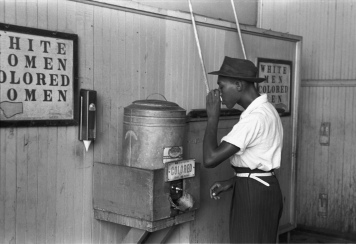
Segregation in the US
thought we would be discussing the issue of police violence, and apparently poor judgment as to how they can better handle these issues.
Yet, here we are, discussing the issue of race. I have found that with any issue; there is rarely a black and white answer. We can say that police officers need to be better trained. And you would be right in saying that. We can say that our government needs to spend more money on educating our children of color, and you would be right. Children of color are also less likely to go to college and more likely to be placed on the well-fare system. All of these can be solved with a better education and more job opportunities. The problem with these solutions is that they are more complicated, and require politicians to make a sensible decision on increasing the minimum wage, placing more funds in disadvantaged schools, and funding programs that help children go to college.
Racism isn’t just about these fundamental changes in a system. It is an essential change in our way of thinking. It is changing in the way that we behave and treat each other.
A friend posted a video on Facebook, with an African American woman who was talking about racism. About two minutes into the video, she stated that racism exists because white people are scared of blacks. When a white person sees a black person, he holds his wallet a little tighter. I thought about that for days, contemplating, am I scared of a black person walking in the mall. I started to go to the memory bank and picture all the times when I clinched my wallet tighter when someone passed me. I came to a new revolution that I am not scared of black people, but I am scared of the preconceived notion that has been inadvertently placed in my mind from movies and television shows. I found that I clinched my wallet just as many times for a white person, that didn’t fit the norms of what media tells us a respectable person should look like. A white person with long hair, tattoos, a frown on his face, maybe slightly sagging his jeans, smoking a cigarette, can be scary and possibly force you to clinch your wallet. Now make that same description, yet a black man. It is no different; each can be scary. Each person, when known, can be friendly, kind and willing to do anything for you. I have known many people who may be scary when seen in the mall, yet would never harm you.

Protesters stand together
If you saw a black man or a white man walking in a suit, you would be less inclined to clinch your wallet. That person also might be the same person that steals your wallet. You can never know, nor predict the good vs. the bad people. I guess my point is that racism often exists because we are naïve, and not willing to look past the skin of someone because we have been told over the years that poverty is often associated with people of color. Yet the poorest county in the US, with 98% of people living on well-fare is predominantly a white community. We don’t see this in the movies or on TV. We see young black people living in poor conditions. We see starving black children on TV. We see schools crumbling before our eyes in diverse neighborhoods. Why do we see that? I am not sure, but maybe it is because it has been the norm for centuries. The norm needs to change; the conversation needs to change.
We need to get passed the pitting us vs. them. This cop beat a black person. Therefore, the cop is racist. We need to get past the #blacklivesmatter and move to real solutions. We need to have a more intellectual conversation about racism. The questions that need to be answered, discussed and solved, is why was the young black man put into the situation, where a police officer bullied, shot or killed the young man. Did the education system fail this child? Why was the police officer racists? What led him to that point? How could the system have been different? Anyone and the media does an excellent job of this, that says the cop is entirely at fault for his racist behavior, isn’t looking at racism from an objective view. You can easily say that police offers see far more black criminals than white, and, therefore, develop a racist perception of an entire population. I am not saying this is right, but I firmly believe that for us to truly understand racism, from both sides, we must fully understand why it became an issue.
The greatest example I can come up with was Nelson Mandela. Mr. Mandela fought his entire life against the white person. He was even on a terrorist list and went to jail for his beliefs. These are stories that are shared knowledge. What we often never hear is that Mr. Mandela, while in prison, realized that if he wanted to get people on his side, he must first understand people. He learned the white man’s language; he learned their beliefs; he spoke with them and knew the deep-rooted history of why they entered into racists views. It was because of this, that when he took back his country, he did the most profound thing he could have done, he forgave them. He didn’t forget the years of oppression, the beatings, and the segregation. The past was deeply ingrained into the future, but forgiving people was the greatest tool towards solving racism. Is there still racism is South Africa, yes, but more people have friends who are different colors, people go to coffee shops and hang out at malls with people who are not the same, and they are making considerable ground towards understanding and coming to grips with racism.
The history of the US should not be forgotten. It is who we are. It is what we look towards when we say never again. However, and this may be the hardest thing for many to do, we need to forgive and say I am sorry. Asian people need to forgive white people for segregating them in camps during WW2. Black people need to forgive white people for the hundreds of years of segregation from slavery to the civil rights movement, Native American’s need to forgive the white man for stealing their land. And, white people need to acknowledge it and say I am sorry.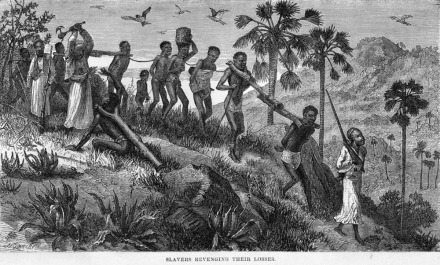
Could it be that simple? Could it be as simple as a grade school solution to solving a fight? No! This is too complicated, but we will get nowhere on the intellectual conversation unless we first acknowledge the situation and are willing to discuss this issue. Saying I
forgive you is not a sign of weakness, nor is it saying that you have forgotten the past. It is a sign that you are willing to stand in a united front against an issue that is starting to define our generation. Saying I am sorry, is not putting you is the same category of your ancestor, or saying that you participated in the segregation or that you are a racist. Saying I am sorry opens up the conversation. Until that conversation happens, we will run in circles and get know where.

Native Americans standing in front of the capital.
So, here I go. I am sorry! I am sorry for my ancestors coming to the US, killing millions of Native Americans and stealing their land. I am sorry for them taking black people from Africa, boarding them on slave ships and shipping them to the US like cargo. I am sorry for every slash of the whip, every tear caused, every punch and slap. I am sorry for making you drink from a different fountain. I am sorry for making you use a separate toilet or sit on the back of the bus. I am sorry for making you go to a different school. I am sorry for police turning hoses on your children or shooting them in the streets. I am sorry for everything. Please believe me, that more people are willing to stand up against racism than participates in it. I think people are confused as to how to handle it. A simple sorry might be the easiest and simplest way to start.
I would love to hear you thoughts, to start that conversation. Let’s make 2016 the year that the conversation truly begins.
Please comment and share.


May 24, 2015
Book Trailer for Amani’s River
Check out the YouTube video trailer for the award-winning...
January 25, 2015
The Indigenous African Culture
From the perspective of an American Abroad
By David Hartness (Author and Freelance Writer)
I first came to Africa in 2006 as an ‘idiot abroad.’ I called myself the idiot, because the culture was so vast, abnormal, scary and something that made my stomach flutter from my nerves of interacting with the people that I couldn’t understand or comprehend the cultural norms. Do I bow? Smile? Shake nervously? Or none of the above. I didn’t know how to act or feel, but I was excited to share my culture, and learn theirs.
 Children at the local school hang out under a tree.I went to Kenya, and spent my time in a remote village on the western side of the country. I called Ebukolo my home for three months. I lived in a small mud hut, made from cow dung, dirt and small sticks to help provide support. I fetched my water from a small river, down a long hill, and carried it back to the small home that sat on a small property with a larger home to share the land.
Children at the local school hang out under a tree.I went to Kenya, and spent my time in a remote village on the western side of the country. I called Ebukolo my home for three months. I lived in a small mud hut, made from cow dung, dirt and small sticks to help provide support. I fetched my water from a small river, down a long hill, and carried it back to the small home that sat on a small property with a larger home to share the land.
I sat in darkness during the night. Sat under a large tree, watching children play during the day, and continued my daily chores, as if it was part of my normal routine. I got up every day, ate my breakfast, and then made the short walk to a small school, where I taught English as a volunteer. I returned home, cleaned the house, washed my clothes by hand in a bucket and laid them out to dry. Checked my water supply, and if needed, made the mile journey to the small river. Upon returning, I went to the local market, made of two kiosks, which sold modest goods and purchased what was needed for the evening dinner. 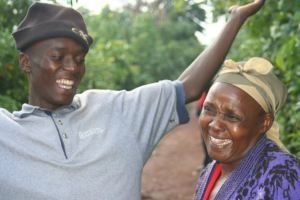
I learned from the locals how to live and survive with what they had, and not with what they could buy. I learned to work the land, and grind maize to make a local dish. I learned to plant, care for the cows, milk them and let them graze the land. I learned how to kill the animals and use everything they gave, in order to make their life meaningful. However, the most important thing learned, was that community helped in whatever way they could. This was evident when I came across a local women who was homeless. She had dirt that covered her face, because she was eating it to get the iron. The women who shared the property with me, my host mother, rushed to her side, invited the homeless women into the home, gave her a meal. She talked with her and soon sent her on her way. I told my host mother that it was kind to see her take care of this women in the way she did. However, my host mother didn’t understand why I praised her for an action that everyone in the village did as a normal way of life. She was a member of the community, therefore, it was everyone responsibility to take care of her.
One day I ate a pastry that was being sold on the side of the streets. To this day, I don’t know what the pastry was made from, but I do know that it made me sick. When my host mother came across me throwing up, she rushed me into the home. I knew why I was sick, and I knew that it would pass, but the look on her face did not share the same sediment. After about thirty minutes of me throwing up and then rushing to the outhouse, she sent her son to the school to fetch the reverend. Not a doctor, or a nurse, or a car that could take me to the hospital, she wanted the reverend, to heal my wounds and pray for my safety. It wasn’t rational, but it was what she knew. He returned promptly, with his family, other colleagues and a few more individuals that I didn’t know. I laid on the bed, sweating, unsure of when I would throw up again. The reverend grabbed my hand, and prayed.
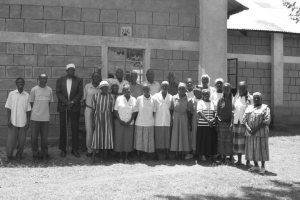 The rest of the community gathered around and prayed for my safety. They prayed to god that I would survive, make it to tomorrow. All I really wanted was to be left alone, allowed to sleep, and rest through the night. What I got was a community who cared, who looked out for their own, and made sure that the people they cared for was okay.
The rest of the community gathered around and prayed for my safety. They prayed to god that I would survive, make it to tomorrow. All I really wanted was to be left alone, allowed to sleep, and rest through the night. What I got was a community who cared, who looked out for their own, and made sure that the people they cared for was okay.
That was the start of a lesson that I learned about Africa, the community is strong, not from the individual or the chief, but strong because of the individuals. Everyone has a responsibility to raise the children, everyone has a responsibility to take care of the elderly and everyone has a responsibility to share with each other what they have to offer.
What you think you know about Africa, think again. We often see only the negative part of Africa, and we have very strong images of this place, full of violence, full of hatred, full of political unrest, but I see the culture of Africa as peaceful. A place that has their moments of violence, and problems, but people that care for one another. Perhaps there are many lessons that we can learn from the indigenous people’s way of life. We can learn to use what we have, live off the land, and care for one another, as if they are family.

January 16, 2015
Amani’s River- now available to preorder
Please visit http://amanisriver.davidhartness.com and click on the Paypal icon to preorder Amani’s River which comes out in March, 2015.
Synopsis
Ten-year-old Aderito has been brought from the United States to the banks of a beautiful river in Homoine, Mozambique. There, he befriends a young girl named Victoria, and for a brief time, their childhood is promising. Soon, the violence that is raging across the country makes its way to Aderito’s doorstep, and both children are abducted by rebels and forced to learn the ways of trained killers in a war they barely understand.
With only each other for support, Victoria and Aderito struggle to remain unnoticed among their peers. But the more Aderito kills, the more he needs killing, channeling all his rage into war and becoming a valuable weapon. Victoria, growing older and prettier by the day, begins to attract unwanted attention from their captors.
Caught in a battle that ravages villages and tears families apart, Aderito knows he cannot expect a happy ending. And yet he and Victoria make brave plans to escape—only to find themselves facing torments that no adult, let alone child, should ever have to face. As Mozambique struggles through its defining crisis, Aderito too must find a way to survive the childhood that will come to define him as a man.
DAVID HARTNESS is a freelance writer and English teacher working in an international setting. An avid traveler, inspired by many cultures, David enjoys using this subject in his blog “A Small Perspective.”
Raised on Vashon, a small island in Puget Sound, Washington, David learned the values of life and hard work to pursue his ambitions. This led him to travel internationally, serving a small school in Ebukolo, Kenya. While in Kenya, he lived in a mud hut with no running water or electricity. Mr. Hartness had ambitions to make lasting change while in Kenya but ended up learning more from the experience than he gave back.
He later served in the U.S. Peace Corps as an education volunteer stationed in Namaacha, Mozambique. Upon leaving service, David continued his education, receiving an MBA from Walden University, and currently enrolled in a DBA program.
David currently lives in Lusaka, Zambia, with his son.
Amani’s River is David’s first full-length novel.
Please visit http://amanisriver.davidhartness.com and click on the Paypal icon to preorder Amani’s River which comes out in March, 2015.

December 7, 2014
Thoughts from a Recovering Racist
This is an issue that is so important, and we need to have conversations about, if we are going to heal the wounds inflicted by our ancestors.
 Originally posted on Joshuathroneburg's Blog:
Originally posted on Joshuathroneburg's Blog:
I grew up white, not just in the color of my skin, but in the culture of my youth. My wife and I call it “super-white”. I was raised in a small farm town in Illinois – white family, white friends, white people at my church, white teachers, white kids in my classes, white players on my sports teams, white players on the teams I played against – WHITE!
My parents are amazing and did well to raise my brother and I as unprejudiced as possible, but that background is a large obstacle when it comes to issues of race.
But I didn’t see it that way. For many years I was convinced that, in spite of my monochromatic background, I was still able to see race issues clearly and with a balanced perspective. And most certainly, I would never have classified myself as a racist.
I was wrong.
To…
View original 1,190 more words

November 29, 2014
Poll to End Child Soldiering
Why do Schools Think it’s OKAY to Micro Manage? Think like a corporation, grow like one too.
As a train ed educator, I sometimes become disgusted by the profession that should allow teachers to mold and shape young minds to become Productive Citizens in Society. I bold this word, because it is the underlining reason why we have a free educational system through secondary school. Elementary and High school is not meant to mold students into doctors or lawyers or even teachers (that is the job of a University). High School is meant to ensure that all citizens have a basic education so that they can help contribute to the growth of the economy. These students could be construction workers, office assistants, or the guy or gal that cleans the septic tank. Each job is important, each job contributes, and none should be treated with anything but respect.
ed educator, I sometimes become disgusted by the profession that should allow teachers to mold and shape young minds to become Productive Citizens in Society. I bold this word, because it is the underlining reason why we have a free educational system through secondary school. Elementary and High school is not meant to mold students into doctors or lawyers or even teachers (that is the job of a University). High School is meant to ensure that all citizens have a basic education so that they can help contribute to the growth of the economy. These students could be construction workers, office assistants, or the guy or gal that cleans the septic tank. Each job is important, each job contributes, and none should be treated with anything but respect.
However, schools have steered away from this principle. They are now forcing teachers to analyse countless sheets of data, write comprehensive reports on standardized tests. They have forced teachers to fill in forms, to show the principals and directors that they are doing their job. Teachers need to spend their own time and resources to ensure that they are meeting every learning objective. Students are asked to write cognitive tests to show them how they think and what their chosen profession should be (don’t forget the role of schools). How teachers teach and what they teach are dictated by these tests. This may sound like a scary movie, but it’s our current education system. The suits and powers to be that run the system, don’t have a clue, but the teachers understand the dangers of teaching to a test.
Everyone needs to show accountability, therefore, micro managing has taken over the educational system. But what is happening, is that teachers are spending too much time showing they are doing the right thing, and not nearly enough time doing what they are paid for, ‘TEACH.’
Think like a Corporation
I know this sounds like a strange concept. A corporation has to manage a budget and grow their business, so does a school. The concepts between corporations and schools are not very different. However, corporations pay their employees better, higher the right people who can do an outstanding job, therefore, the need to micro manage is eliminated. 
Microsoft would not dream of paying their software designers a teachers salary and expect the same results. I was discussing with a local man in Zambia once, about the education system. I explained that teachers in Zambia are grossly underpaid, and many have two or three jobs to support their family. If someone paid me the same salary, they would get their monies worth, which wouldn’t be much. If you want to get productive teachers, you need to do a few things; pay them more, provide more staff for support, that can complete some of the administrative work, and treat them like professionals.
Too often, teachers feel undervalued, because electronic tests are taking over, and telling them what to do, and how to do it. Teachers feel that the system is broken, and can’t change. Many teachers are getting out of the profession, and rightfully so. If they have to sit and complete administrative work, they may as well go work at a bank, or large corporation. Their skills would be valued, they would make more money, have reasonable hours, but more importantly they would be treated with respect.
If you have a comment please leave one. If you work at a school that acts differently, please share, as I would love to hear some positive news/ideas from a broken system.
[contact-form]





